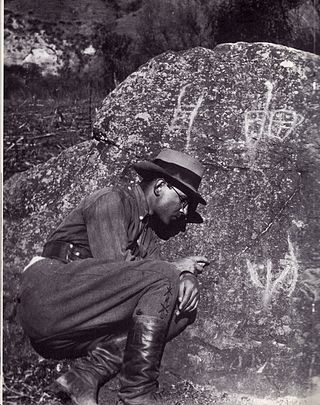External links
| International | |
|---|---|
| National | |
| Other | |
| | This article about an American anthropologist is a stub. You can help Wikipedia by expanding it. |
Tobias Hecht (born 18 February 1964) is an American anthropologist, ethnographer, and translator.
Hecht was born in Seattle, Washington. He received his B.A. from Columbia University in 1986 and his Ph.D. in Social Anthropology in 1995 from the University of Cambridge, [1] and was the winner of the 2002 Margaret Mead Award, for his book At Home in the Street: Street Children of Northeast Brazil, an innovative study of street children in Northeastern Brazil. [2]
In 2002–2003 he was the recipient of a Harry Frank Guggenheim Foundation research grant for his work on The violent life of Bruna Verissimo: An experimental ethnographic biography of a homeless Brazilian youth. [3] His 2006 novel After Life: An Ethnographic Novel was based in part on that work. [4]
In 2005 Hecht placed second in the Hucha de Oro, Spain's most important literary competition for short works of fiction. [5] He taught at Pomona College. [6]

The Claremont Colleges are a consortium of seven private institutions of higher education located in Claremont, California, United States. They comprise five undergraduate colleges —Pomona College, Scripps College, Claremont McKenna College (CMC), Harvey Mudd College, and Pitzer College—and two graduate schools—Claremont Graduate University (CGU) and Keck Graduate Institute (KGI). All the members except KGI have adjoining campuses, together covering roughly 1 sq mi (2.6 km2).

Pomona College is a private liberal arts college in Claremont, California. It was established in 1887 by a group of Congregationalists who wanted to recreate a "college of the New England type" in Southern California. In 1925, it became the founding member of the Claremont Colleges consortium of adjacent, affiliated institutions.

Pitzer College is a private liberal arts college in Claremont, California. One of the Claremont Colleges, the college has a curricular emphasis on the social sciences, behavioral sciences, international programs, and media studies. Pitzer is known for its social justice culture and experimental pedagogical approach.

Lydia Cabrera was a Cuban independent ethnographer, writer, and literary activist. She was an authority on Santería and other Afro-Cuban religions. During her lifetime she published over one hundred books; little of her work is available in English. Her most important book is El Monte, which was the first major ethnographic study of Afro-Cuban traditions, herbalism and religion. First published in 1954, the book became a "textbook" for those who practice Lukumi and Palo Monte both religions reaching the Caribbean through enslaved Africans. Her papers and research materials were donated to the Cuban Heritage Collection - the largest repository of materials on or about Cuba located outside of Cuba - forming part of the library of the University of Miami. A section in Guillermo Cabrera Infante's book Tres Tigres Tristes is written under Lydia Cabrera's name, in a comical rendition of her literary voice. She was one of the first writers to recognize and sensitively publish on the richness of Afro-Cuban culture and religion. She made valuable contributions in the areas of literature, anthropology, art, ethnomusicology, and ethnology.

Visual anthropology is a subfield of social anthropology that is concerned, in part, with the study and production of ethnographic photography, film and, since the mid-1990s, new media. More recently it has been used by historians of science and visual culture. Although sometimes wrongly conflated with ethnographic film, visual anthropology encompasses much more, including the anthropological study of all visual representations such as dance and other kinds of performance, museums and archiving, all visual arts, and the production and reception of mass media. Histories and analyses of representations from many cultures are part of visual anthropology: research topics include sandpaintings, tattoos, sculptures and reliefs, cave paintings, scrimshaw, jewelry, hieroglyphics, paintings and photographs. Also within the province of the subfield are studies of human vision, properties of media, the relationship of visual form and function, and applied, collaborative uses of visual representations.

Morris Edward Opler, American anthropologist and advocate of Japanese American civil rights, was born in Buffalo, New York. He was the brother of Marvin Opler, an anthropologist and social psychiatrist.

Alfred Métraux was a Swiss and Argentine anthropologist, ethnologist and human rights leader.
David Heath French was an American anthropologist and linguist from Bend, Oregon. During his lifetime he was considered the foremost academic authority on the Chinookan people of the middle Columbia River, especially the Wasco-Wishram Chinooks of the Warm Springs Indian Reservation in Oregon. His research focused on ethnobotany and language.
Robert Francis Murphy was an American anthropologist and professor of anthropology at Columbia University in New York City, from the early 1960s to 1990. His field work included studies of the Munduruku (Mundurucu) people of the Amazon and the Tuareg people of the Sahara.
Nancy Scheper-Hughes is an anthropologist, educator and author. She is the Chancellor’s Professor Emerita of Anthropology and the director and co-founder of the PhD program in Critical Medical Anthropology at the University of California, Berkeley. She is known for her writing on the anthropology of the body, hunger, illness, medicine, motherhood, psychiatry, psychosis, social suffering, violence and genocide, death squads, and human trafficking.
João Guilherme Biehl is a Brazilian anthropologist who is the Susan Dod Brown Professor of Anthropology at Princeton University, where he is also the Co-Director of the Program of Global Health and Health Policy and where he holds an Old Dominion Professorship at the Council of Humanities, as well as being a Visitor at the School of Social Sciences of the Institute for Advanced Study. He specializes in medical anthropology, and his interests include social studies of science and religion, psychological anthropology, globalization and development, global health, ethnographic methods, critical theory, and Brazilian and Latin American societies. He is the winner of the Rudolf Virchow Award given by the Society for Medical Anthropology, the Margaret Mead Award in 2007, the Presidential Distinguished Teaching Award in 2005, and Princeton Universities' Graduate Mentoring Award in 2012.

Ruth Landes was an American cultural anthropologist best known for studies on the Brazilian religion of Candomblé and her published study on the topic, City of Women (1947). Landes is recognized by some as a pioneer in the study of race and gender relations.

An ethnographic film is a non-fiction film, often similar to a documentary film, historically shot by Western filmmakers and dealing with non-Western people, and sometimes associated with anthropology. Definitions of the term are not definitive. Some academics claim it is more documentary, less anthropology, while others think it rests somewhere between the fields of anthropology and documentary films.

Susana Chávez-Silverman is a U.S. Latina writer and professor of Romance Languages and Literatures at Pomona College in Claremont, California.

Dru Curtis Gladney was an American anthropologist who was president of the Pacific Basin Institute at Pomona College and a professor of anthropology there. Gladney authored four books and more than 100 academic articles and book chapters on topics spanning the Asian continent.
Ann Taves is Distinguished Professor of Religious Studies at the University of California, Santa Barbara. She is a former president of the American Academy of Religion (2010). From July 2005–December 2017, she held the Cordana Chair in Catholic Studies at UC Santa Barbara. Taves is especially known for her work Religious Experience Reconsidered (2009), stressing the importance of the findings and theoretical foundations of cognitive science for modern religionists.

Luis Aguilar Monsalve is an Ecuadorian writer, critic, and professor emeritus at Hanover College in the United States.

Pomona-Pitzer Sagehens is the joint varsity intercollegiate athletics program for Pomona College and Pitzer College, two of the Claremont Colleges. It competes with 11 women's and 10 men's teams in the Southern California Intercollegiate Athletic Conference (SCIAC) of the NCAA Division III.

Elena Fernández Gómez, known by the pen name Elena Santiago, was a Spanish writer of novels, short stories and children's literature. She was the recipient of honors such as the Rosa Chacel Award, the 1999 Province of Valladolid Literary Prize, and the Castile and León Award for Letters.

Michael Leslie Brewster was an American artist, recognized for coining the term “acoustic sculpture.” He worked with sound to create sonic environments beginning in the 1970s until 2016. His works were shown across the United States and Europe, and are in permanent collections, notably the Solomon Guggenheim Museum, the Fondo per Arte Italiano, Museum of Contemporary Art Los Angeles, and the Giuseppe Panza Collection.